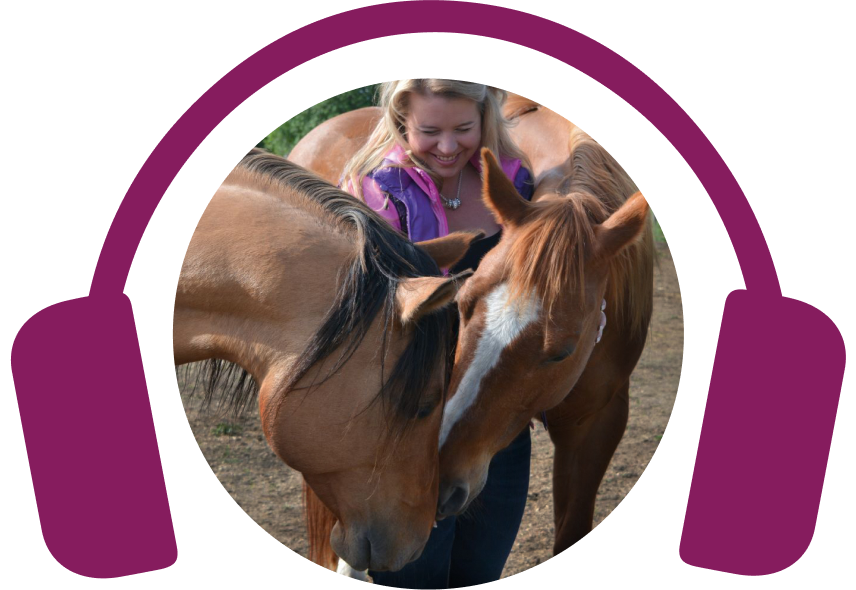Elisha’s Podcast
ELISHA’S PODCAST

Ready to get your horses on the path to better health?
This podcast was created to do just that.
Tune in to get new insights, perspectives, horse health tips, and real-life horse healing stories.
Take what you learn and apply it to your horse TODAY.

One Conversation at a time
From learning what to feed your horse and how to use nutrition effectively, to practicing prevention and approaching specific health challenges naturally, to just bringing your horse more joy and better health…
I’ve got you covered!

Check out my recent episodes
This week, we are diving into skin problems with horses. Skin problems are hard to ignore. They are right in your face, so they grab your attention instantly. Types of Skin Problems in Horses Skin issues range from dry, flaky skin to severe allergic reactions. Horses may suffer from hives, sweet itch, infections like rain rot or mud fever, and chronic itchy skin. These conditions may appear as sudden, alarming outbreaks or develop into persistent, long-term struggles. Why Skin Problems Demand Attention Unlike hidden health issues, skin problems are visible and alarming, often pushing owners to act quickly. Acute flare-ups can appear to be emergencies, and chronic flare-ups may frustrate owners when topical treatments and medications only provide temporary relief. Beyond the Surface The skin is an organ and part of the immune system. When reactions occur externally, it is a sign of deeper imbalances, such as inflammation, immune dysfunction, or a toxin overload that can also affect internal systems. Digestive Problems Digestive problems often correlate with skin flare-ups. Ulcers, leaky gut, and poor liver function can raise histamine levels, leading to hives, itching, and chronic skin irritation. When the liver and gut cannot properly eliminate toxins, issues frequently surface in the skin. The Role of Histamines Histamine release is a natural immune response that can cause symptoms like swelling, itching, and hives. Horses with gut issues often produce excess histamine, making them more prone to skin outbreaks. Treating your horse only with antihistamines can suppress symptoms, but that does not solve the root cause. Diet and Allergens Some feeds can trigger skin reactions. Allergies or intolerances (such as to alfalfa) may take years to appear as acute symptoms. Long-term toxic buildup from feed, medication, or supplements can overload detox pathways and weaken skin health. Liver Health The liver plays a central role in detoxification. Over time, medications, poor nutrition, or stress can overwhelm the liver, leading to chronic skin problems. Supporting liver health is the key to sustainable recovery. Triggers Hormone imbalances and stress can affect skin health. Stress-related cortisol and adrenaline spikes increase histamine production, sometimes also triggering ulcers and hives. Managing stress is critical for restoring balance. Long-Term Solutions Quick fixes rarely last. Holistic management focuses on supporting digestion, detox pathways, nutrient balance, and emotional well-being. Owners may need to experiment and make gradual adjustments to find lasting solutions. Key Takeaways Skin health reflects whole-body health. A methodical approach that addresses gut health, liver function, diet, hormones, and stress will lead to lasting improvements, whereas symptom-only treatments will keep horses stuck in recurring cycles. Do you know what exactly is in your horse's supplements, and what they're actually doing for their health? Keeping your horse's diet and supplement program clean is one of the most beneficial things you can do for them. There is nothing that turns a horse's health around faster than cleaning up their diet and supporting their health from the inside out. The good news is I'm going live on Saturday, December 6, 2025, at 10 am Mountain Standard Time, and I invite you to join me for my first-ever two-hour workshop called Detox Done Right: How To Reduce Your Horse's Toxic Load and Upgrade Their Health. For just $127 Canadian, you will get my hands on my label-reading playbook and my clean feed roadmap- and we will finish with a 30-minute Q&A to help turn your supplement confusion into clarity. If you care about your horse's health and want real, practical steps that lead to results, then this workshop is just for you! Save your seat by clicking on the link in the show notes, or head over to my website. No need to worry if you register and miss it because I will have a recording waiting for you, whenever you are ready- but I do hope to see you all there, live! Links and resources: Connect with Elisha Edwards on her website Join my email list to be notified about new podcast releases and upcoming webinars. Free Webinar Masterclass: Four Steps to Solving Equine Metabolic Syndrome Naturally Register for my self-paced course, Resolving Equine Metabolic Syndrome Naturally. The thyroid gland plays a crucial role in the metabolic health and overall vitality of horses, yet it is often overlooked or treated only when serious problems arise. Understanding the role of the thyroid gland and the factors that support or hinder it is the key to long-term equine wellness. Remember that supporting your horse’s health holistically always begins with their diet, lifestyle, and stress reduction. Recognizing Thyroid Imbalance Changes in the coat are often the first visible sign of thyroid imbalance. Horses may develop coarse or dry hair, experience hair loss, shed slowly, or grow curly hair. Those changes are all tied to the thyroid and could overlap with pituitary dysfunction. Metabolism and Temperature Regulation Thyroid health strongly influences weight and temperature regulation. Horses may gain weight despite appropriate feed and exercise, or show cold intolerance by shivering when others remain comfortable. Those signs reflect compromised heat production and metabolic function. Hormones and Reproductive Health Hormones are interconnected, so a thyroid imbalance could also affect the cycling and overall reproductive health of mares. Disruption in one hormone system influences others, highlighting the importance of a holistic approach. Behavior and Energy Levels Thyroid imbalance could manifest as depression, fatigue, or anxiety. Horses may withdraw from herd interaction, appear less playful, or become unexpectedly reactive despite consistent training. Physiological health can drive behavioral changes that horse owners should never overlook. Muscle Health and Mineral Balance Muscle weakness is another possible sign of thyroid imbalance. Selenium deficiency can also present similarly, highlighting the importance of evaluating mineral balance in addition to glandular health. Minerals often influence multiple systems simultaneously. Closing Thoughts Thyroid function is complex because it interacts with the pituitary gland, reproductive hormones, metabolism, and mineral balance. Paying attention to any changes occurring in the hair, coat, weight, temperature tolerance, behavior, and muscle strength can provide practical clues to possible metabolic imbalance. When those signs are present, it is essential to seek the right help to explore whether thyroid health may be a contributing factor. Do you know what exactly is in your horse's supplements, and what they're actually doing for their health? Keeping your horse's diet and supplement program clean is one of the most beneficial things you can do for them. There is nothing that turns a horse's health around faster than cleaning up their diet and supporting their health from the inside out. The good news is I'm going live on Saturday, December 6, 2025, at 10 am Mountain Standard Time, and I invite you to join me for my first-ever two-hour workshop called Detox Done Right: How To Reduce Your Horse's Toxic Load and Upgrade Their Health. For just $127 Canadian, you will get my hands on my label-reading playbook and my clean feed roadmap- and we will finish with a 30-minute Q&A to help turn your supplement confusion into clarity. If you care about your horse's health and want real, practical steps that lead to results, then this workshop is just for you! Save your seat by clicking on the link in the show notes, or head over to my website. No need to worry if you register and miss it because I will have a recording waiting for you, whenever you are ready- but I do hope to see you all there, live! Links and resources: Connect with Elisha Edwards on her website Join my email list to be notified about new podcast releases and upcoming webinars. Free Webinar Masterclass: Four Steps to Solving Equine Metabolic Syndrome Naturally Register for my self-paced course, Resolving Equine Metabolic Syndrome Naturally. In Episode 13 last year, I covered some of what I discussed in my free webinar series, Become Your Horse’s Healer. We have a replay of that episode today, so tune in to learn how to reset your expectations for your horse’s health. Understanding Healing Patterns Horses usually respond to healing programs in four different ways. Some horses respond positively to a new program and show rapid improvement. Others experience a temporary worsening of their conditions as their bodies start the healing process, often marked by fatigue or increased inflammation. Some horses show initial improvement followed by a later setback, while others progress gradually. Emotional and Physical Health Interplay Healing is a complex journey that involves physical, emotional, spiritual, and mental health. In addition to addressing their physical symptoms, owners must understand the emotional aspects that might impact their horse's well-being. Challenges may arise when a horse’s physical and emotional health are misaligned. Recognizing all the interconnected elements is essential for comprehensive care and successful healing. Setting Realistic Expectations and Goals It is essential to set realistic expectations at the start of a health journey. Each horse has a unique healing trajectory, and patience is paramount. Making rushed decisions due to having unrealistic expectations could lead to setbacks. Owners need to acknowledge their horse's individuality, taking their age, constitution, and any chronic conditions they may have into account. Horses with a more robust constitution and those at risk due to breed characteristics may respond differently. Understanding these factors allows owners to tailor their expectations and approaches accordingly. Setting achievable goals and celebrating small victories allow owners to navigate the healing process with more of a positive mindset. Addressing Obstacles to Recovery In some instances, despite your well-intentioned efforts, obstacles may still hinder your horse’s progress. So it is crucial to identify physical and emotional sources of toxicity or address the lifestyle factors that impede the healing process. Gradual changes, observation, and responsiveness to the horse's cues help create a more effective healing environment. Chronic Nature of Diseases and Pathology Chronic diseases in horses are particularly challenging. Conditions such as side bone, ring bone, and bone remodeling in the feet or joints that show tissue changes complicate issues. Horse owners must learn to distinguish inflammation from degeneration because once tissues (especially bone) start changing, it complicates recovery. Setting realistic expectations is crucial for determining whether or not full recovery is possible. Genetic Predispositions and Melanomas Genetic predispositions, like melanomas or related conditions, impact a horse's health. (White and grey horses often have melanomas due to genetic factors.) Improvement is possible in those cases, especially when owners can recognize the genes that influence the disease expression. Managing a horse’s diet, nutrition, and lifestyle is crucial for modulating genetic expression and switching off detrimental genes to mitigate their effects. Constitution and Environmental Factors The constitution of a horse is influenced by factors starting in the womb. In some horses, constitutional weaknesses show up as susceptibility to allergies or illnesses. With proper care, strengthening a horse's constitution is possible. With certain breeds, especially easy-keepers that are predisposed to conditions like insulin resistance, owners may need to tailor their expectations to incorporate genetic and environmental factors. Managing Expectations for Aging Horses Owners of senior horses must manage their expectations. They need to understand that complete recovery may not always be possible and shift their focus instead to preventing further damage and supporting connective tissue for prolonged mobility. Adjusting expectations for older horses with long-term conditions (such as PPIID) involves looking for visible improvements, such as higher energy levels and reduced inflammation, rather than expecting rapid recovery. Obstacles to Recovery It is essential to recognize any obstacles to recovery, like sources of toxicity or stressful lifestyle factors. Parasite infections, viruses, bacteria, and medications can all hinder progress. Emotional factors can also impact a horse's well-being. Identifying and addressing those obstacles requires a comprehensive approach. The absence of any change might suggest the need to reevaluate the strategy to pinpoint any elements omitted in the care plan. Emotional Connection Between Horses and Owners The emotional connection between horses and their owners is significant because it influences how the horse responds to stressors. Some horses may even prioritize the well-being of their owner over their health. Making Gradual Changes Owners must make gradual changes to avoid becoming overwhelmed or overwhelming their horse. By changing one aspect at a time, owners can be more focused while assessing the horse's response, reducing guesswork and potential self-sabotage in their care plan. Conclusion Navigating a horse's health journey involves embracing the unpredictable nature of healing patterns and considering various factors influencing the recovery. By understanding those dynamics, owners can set realistic expectations, foster a positive healing environment, and celebrate the gradual progress that ultimately leads to improved well-being. Do you know what exactly is in your horse's supplements, and what they're actually doing for their health? Keeping your horse's diet and supplement program clean is one of the most beneficial things you can do for them. There is nothing that turns a horse's health around faster than cleaning up their diet and supporting their health from the inside out. The good news is I'm going live on Saturday, December 6, 2025, at 10 am Mountain Standard Time, and I invite you to join me for my first-ever two-hour workshop called Detox Done Right: How To Reduce Your Horse's Toxic Load and Upgrade Their Health. For just $127 Canadian, you will get my hands on my label-reading playbook and my clean feed roadmap- and we will finish with a 30-minute Q&A to help turn your supplement confusion into clarity. If you care about your horse's health and want real, practical steps that lead to results, then this workshop is just for you! Save your seat by clicking on the link in the show notes, or head over to my website. No need to worry if you register and miss it because I will have a recording waiting for you, whenever you are ready- but I do hope to see you all there, live! Links and resources: Connect with Elisha Edwards on her website Join my email list to be notified about new podcast releases and upcoming webinars. Free Webinar Masterclass: Four Steps to Solving Equine Metabolic Syndrome Naturally Register for my self-paced course, Resolving Equine Metabolic Syndrome Naturally.
Meet your host
Hi there, I’m Elisha Edwards

Meet your host
Hi there, I’m Elisha Edwards
I have helped guide thousands of horses back to good health over the years from a variety of different health challenges. And through my courses, webinars, and speaking engagements I educate and empower horse owner’s from around the world to take charge of their horse’s health using the holistic model of health care.
So I know first-hand how difficult and overwhelming it can be to navigate all the different opinions and conflicting information that you come across especially when your horse is faced with a health problem. In many cases, the journey is just as hard on the owners as it is on the horses.
I started Healing Horses with Elisha to guide you, support you, and encourage you through the process of prevention and recovery so you feel good about the decisions you’re making for them.
Here’s what I believe
I have seen countless horses with seemingly impossible health conditions that have been resolved so easily with the right combination of diet, nutrition, and natural remedies. In many cases, it is not the health conditions that prevents the horse from recovering, it is the lack of education, resources, and options that are available.
If the insight and information you gain from this podcast gives you some newfound hope or inspires you to take
a new approach then it has served it’s purpose.
Thank you for giving me the opportunity to help you improve your horse’s health.
Keep listening and learning. Your horse is worth it.
Listen Now
Tune in wherever you listen to your podcasts and follow me so you never miss an episode. I release a new one every Tuesday!

Leave a Review
Reviews help me reach more horses and also help me deliver more relevant content to you!

What my Listeners are saying
“Every time I think there is no way to top what you do – you elevate us to yet another level. I wish I had a fraction of your communication skills. You’re amazing and I am so grateful to be apart of the magic you are creating for horses and their humans.”
Tracey
“Your podcasts are fantastic! I get so excited to listen to the next one. I have 6 geriatric horses and your podcast has really opened my mind to new possibilities in their health and given me the strength to help them through hiccups in their well-being the past few months. I have a nursing education and you explain pathology better than my university professors.”
Sharon
“I can’t thank you enough for the Mindset Tips podcast. I really needed this reminder. It was just what I needed to hear to today.”



